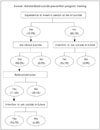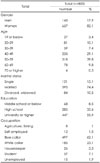Abstract
Objectives
Since 2003 South Korea's suicide rate has remained the highest among Organization for Economic Cooperation and Development countries. Gatekeeper training is a major strategy in the national suicide prevention plan in Korea. In this study, we evaluated the effect of the Korean standardized suicide prevention program on the gatekeeper's intervention, developed by the Korea Association for Suicide Prevention and implemented by the Korea Suicide Prevention Center.
Methods
A telephone survey was conducted in order to assess awareness and intervention for the high risk group. Out of the 35825 people who completed the educational course in 2013, 800 gatekeepers were selected by proportional quota sampling.
Results
Of the 800 subjects, 93% answered that people in the high risk group of suicide sent diverse signals implying suicide ; 19.9% of the gatekeepers found actual high risk suicidal people, 95% of whom listened to why they came to think about suicide and 71.5% of listeners gave information about suicide prevention and referred them to mental health professionals.
Figures and Tables
References
1. National Statistical Office. Annual report on the cause of death statistics 2012. Daejeon: National Statistical Office;2012.
2. Mann JJ, Apter A, Bertolote J, Beautrais A, Currier D, Haas A, et al. Suicide prevention strategies: a systematic review. JAMA. 2005; 294:2064–2074.
4. Beautrais A, Fergusson D, Coggan C, Collings C, Doughty C, Ellis P, et al. Effective strategies for suicide prevention in New Zealand: a review of the evidence. N Z Med J. 2007; 120:U2459.
6. Living Works Education Inc [homepage on the Internet]. Applied Suicide Intervention Skills Program: the benefits live on. Calgary, AL: Living Works Education Inc.;2005. cited 2014 Aug 20. Available from: http://www.livingworks.net.
7. Quinnet P. QPR for suicide prevention. Spokane, WA: QPR Institute;1995.
8. Yellow Ribbon Suicide Prevention Program. Yellow Ribbon International for Suicide Prevention. Westminster, CO: Yellow Ribbon Suicide Prevention Program;2007.
9. Isaac M, Elias B, Katz LY, Belik SL, Deane FP, Enns MW, et al. Gatekeeper training as a preventative intervention for suicide: a systematic review. Can J Psychiatry. 2009; 54:260–268.

10. Rutz W, von Knorring L, Wålinder J. Long-term effects of an educational program for general practitioners given by the Swedish Committee for the Prevention and Treatment of Depression. Acta Psychiatr Scand. 1992; 85:83–88.

11. Szanto K, Kalmar S, Hendin H, Rihmer Z, Mann JJ. A suicide prevention program in a region with a very high suicide rate. Arch Gen Psychiatry. 2007; 64:914–920.

12. Hegerl U, Althaus D, Schmidtke A, Niklewski G. The alliance against depression: 2-year evaluation of a community-based intervention to reduce suicidality. Psychol Med. 2006; 36:1225–1233.

13. Knox KL, Litts DA, Talcott GW, Feig JC, Caine ED. Risk of suicide and related adverse outcomes after exposure to a suicide prevention programme in the US Air Force: cohort study. BMJ. 2003; 327:1376.

14. Korean Association for Suicide Prevention. Developement committee of Korean standardized suicide prevention education program. Korean standardized suicide prevention program. Seoul: Korean Association for Suicide Prevention;2012.
15. Ministry of Health and Welfare, Korean Suicide Prevention Center. Annual report of Korean standardized suicide prevention program 2013. Sejong: Ministry of Health and Welfare;2013.
16. Neimeyer RA, Bonnelle K. The Suicide Intervention Response Inventory: a revision and validation. Death Stud. 1997; 21:59–81.

17. Dolev R, Russel P, Griesbach D, Lardner C. The Use and Impact of Applied Suicide Intervention Skills Training (Asist) in Scotland: An Evaluation. cited 2014 Aug 20. Available from: http://www.scotland.gov.uk/socialresearch.
18. Capp K, Deane FP, Lambert G. Suicide prevention in Aboriginal communities: application of community gatekeeper training. Aust N Z J Public Health. 2001; 25:315–321.

19. Matthieu MM, Cross W, Batres AR, Flora CM, Knox KL. Evaluation of gatekeeper training for suicide prevention in veterans. Arch Suicide Res. 2008; 12:148–154.

20. King KA, Smith J. Project SOAR: a training program to increase school counselors' knowledge and confidence regarding suicide prevention and intervention. J Sch Health. 2000; 70:402–407.

21. Chagnon F, Houle J, Marcoux I, Renaud J. Control-group study of an intervention training program for youth suicide prevention. Suicide Life Threat Behav. 2007; 37:135–144.





 PDF
PDF ePub
ePub Citation
Citation Print
Print




 XML Download
XML Download